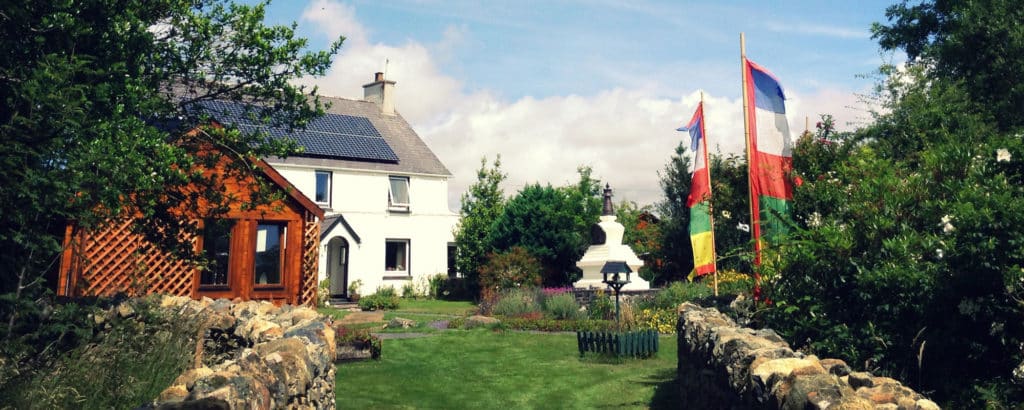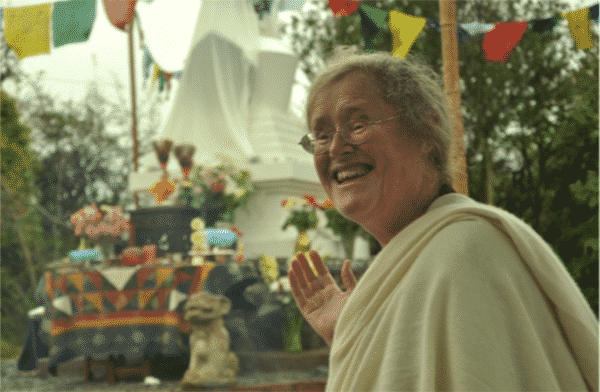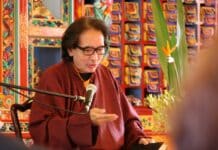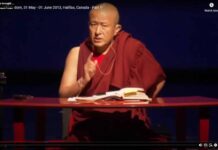
It is with great pleasure that I write this tribute to the Vidyadhara and with some awe and trepidation. How can I write anything that will measure up to the occasion and to his greatness?
As for so many of us, meeting him had a profound influence on my life. We used to invite him to come to speak to the Buddhist Society at Reading University in the late 60s when he was still wearing monk’s robes. I remember his speaking to a crowded and darkened room of the origin of the Universe (as it seemed to me). Maybe he was talking about Dzogchen. All I remember is the depth of the experience. I don’t remember anything he said.
He naturally inspired an unquestioning confidence in me and I went a few times to Samye Ling to ask him about meditation. I remember him telling me to go outside and meditate on space and to welcome all thoughts as guests. I realise now that I didn’t pick up on the significance of space at that time, but the ‘welcoming thoughts as guests’ had an immediate and profound effect on my whole attitude to life. What struck me most at the time was that welcoming thoughts was the same as welcoming others. Equal appreciation of thoughts was equal appreciation of others.
A poignant memory of that time relates to the poem that he wrote called ‘The Silent Song of Loneliness’ (It later appeared in his book of poems called ‘Mudra’). The second verse reads:
The wild duck, companionless,
Cries out in desolate loneliness,
And flies alone, wings outstretched,
Soaring in the boundless sky.
Someone read the poem at dusk in a darkening shrine room and it touched me to tears. It was one of those moments. That very morning at dawn I had stood on the doorstep of Samye Ling, listening to the plaintive cry of a lone, wild-duck as it winged its way steadily across the open sky, emerging from the far distance in one direction and disappearing into the far distance in the other — a many faceted metaphor that has haunted me ever since.
It was at the Vidyadhara’s suggestion that I went to India and took meditation instruction from his friend Karma Thinley Rinpoche and I often wonder what would have happened in Britain if Karma Thinley Rinpoche had accepted the Vidyadhara’s invitation to join him in Samye Ling at that time. Karma Thinley Rinpoche was clearly torn, but ended up going to Toronto. It was many years before I was able to reconnect to the Vidyadhara and it came about because of Khenpo Tsultrim Gyamtso’s insistence that I should go to the Vidyadhara to learn dharma in my own language. Up to that point I had learned all my dharma in Tibetan.
This instruction from Khenpo Tsultrim Gyamtso Rinpoche led directly to my meeting with and marrying Rigdzin Shikpo (who was then Michael Hookham). Rigdzin Shikpo had stayed in Britain all those years since the Vidyadhara had given him Dzogchen teachings in the 60s. Throughout all the years I have known Rigdzin Shikpo his every Dharma talk, public and private, has been smattered with constant references to what the Vidyadhara said to him and his deepening appreciation of the significance of what he had said. In this way I was blessed with the immeasurable benefit of talking directly on a daily basis with someone deeply connected to the Vidyadhara. It was dharma in my own language. This has profoundly affected the way I think, practise, talk about and teach dharma, so that my students in the Awakened Heart Sangha are deriving the benefit of this stream of inspiration flowing directly from the Vidyadhara’s time in Britain all those years ago.

I and my students have been remembering and rejoicing in our connection with the Vidyadhara’s lineage during the last month, feeling very close to all those equally inspired by his life and teaching. We are an integral part of the great mandala of his teaching activity continuing in the world and bubbling up all over the place, hopefully for generation upon generation to come.










